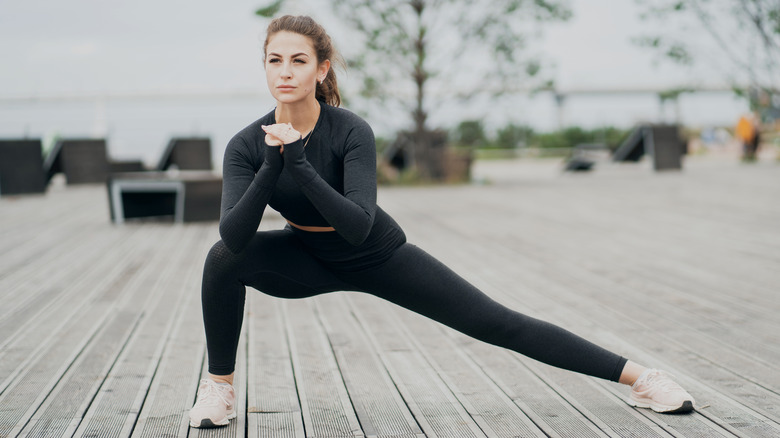What Happens To Your Knees When You Run Every Day
Running is widely known as an excellent form of cardiovascular exercise that helps keep your body fit and reduces stress. Given how healthy running can be, it's no wonder that in 2017 almost 56 million people in the U.S. participated in some form of running, according to Statista.
While running offers many health benefits, remember that running can also potentially be hard on the body — especially the knees — and so it is important to know the risks you could be in for if you run every day.
For instance, Bert Mandelbaum, M.D., orthopedic surgeon and sports medicine specialist at Cedars-Sinai Kerlan-Jobe Institute in Los Angeles, tells Everyday Health that if you try to take on too much running too soon, you could end up with "runner's knee," also known by the medical term, patellofemoral pain syndrome. The symptoms for runner's knee include pain around or behind the kneecap.
"One of the risks with running is that you increase the chances of getting some type of stress-related injury, because you're putting additional stress on your bones, tendons, and cartilage, and that includes the knees," Dr. Mandelbaum tells Everyday Health.
If you have knee pain, Dr. Mandelbaum advises to refrain from running until the pain subsides and then scale up slowly, starting with brisk walking and then slowly increasing your distance and speed. He also strongly advises warming up before running — or any exercise — and to also include leg-strengthening exercises as part of your workouts to build up better muscular support for the knees.
Other ways frequent running can affect your knees
According to Jeffrey Senall, M.D., an orthopedic surgeon with Northwestern Medicine, in addition to runner's knee, a condition called iliotibial band syndrome (ITBS) can also afflict runners. ITBS pain originates on the side of the knee and can also travel to the thigh and sometimes up to the hip, along the iliotibial band that provides support with hip rotation and knee stabilization. "In almost all cases, ITBS can be cured with moderate physical therapy once or twice per week combined with additional strength training," says Dr. Senall.
Even though overuse of the knees or incorrect running technique can lead to knee injuries, Dr. Senall debunks the common myth that running causes osteoarthritis. "It's very common for people to say, 'How do you run? Doesn't that ruin your knees?'" Dr Mayer says. He adds that recent studies have proven the opposite, and that running tends to protect the knees from developing arthritis.
While Dr. Mayer suggests that runners should not be concerned about developing osteoarthritis, he strongly advises that runners, or any other type of athlete, pay attention to pain and seek treatment as early as possible to avoid exacerbating the injury and a prolonged recovery time.


